(完整版)接宾语补足语的动词汇总
Unit6动词不定式作宾语补足语和目的状语-2023-2024学年八年级英语上册(牛津译林版)
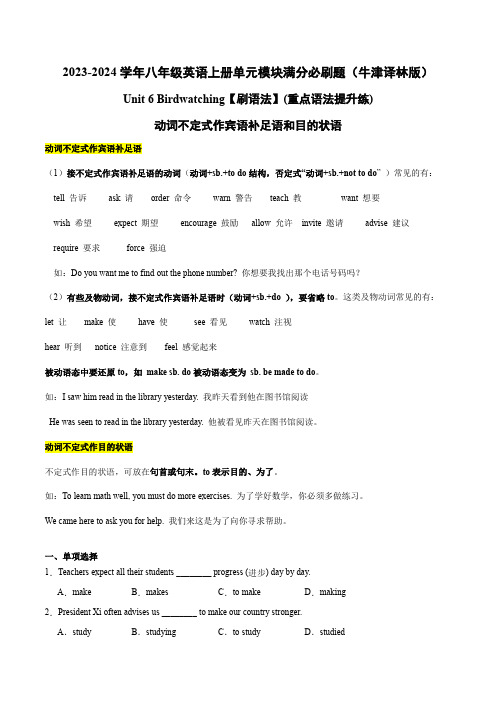
2023-2024学年八年级英语上册单元模块满分必刷题(牛津译林版)Unit 6 Birdwatching【刷语法】(重点语法提升练)动词不定式作宾语补足语和目的状语动词不定式作宾语补足语(1)接不定式作宾语补足语的动词(动词+sb.+to do结构,否定式“动词+sb.+not to do” )常见的有:tell 告诉ask 请order 命令warn 警告teach 教want 想要wish 希望expect 期望encourage 鼓励allow 允许invite 邀请advise 建议require 要求force 强迫如:Do you want me to find out the phone number? 你想要我找出那个电话号码吗?(2)有些及物动词,接不定式作宾语补足语时(动词+sb.+do ),要省略to。
这类及物动词常见的有:let 让make 使have 使see 看见watch 注视hear 听到notice 注意到feel 感觉起来被动语态中要还原to,如make sb. do被动语态变为sb. be made to do。
如:I saw him read in the library yesterday. 我昨天看到他在图书馆阅读He was seen to read in the library yesterday. 他被看见昨天在图书馆阅读。
动词不定式作目的状语不定式作目的状语,可放在句首或句末。
to表示目的、为了。
如:To learn math well, you must do more exercises. 为了学好数学,你必须多做练习。
We came here to ask you for help. 我们来这是为了向你寻求帮助。
一、单项选择1.Teachers expect all their students ________ progress (进步) day by day.A.make B.makes C.to make D.making2.President Xi often advises us ________ to make our country stronger.A.study B.studying C.to study D.studied3.—Our English teacher asks us ________ English every day.—So my mother made me ________ the English text for half an hour yesterday evening.A.read; to read B.to read; to read C.to read; read4.There are many rules in Mary’s home. Her parents won’t allow her ________ out late.A.to stay B.staying C.stay D.stayed5.I see Tom ________ English almost every morning.A.reads B.read C.reading D.to read 6.Teachers always encourage their students ________ questions and discuss the answers.A.answer B.answers C.answering D.to answer 7.The workers in the nature park ask visitors not ________ the animals.A.feed B.to feed C.feeding D.fed8.My mother asks me ________ computer games before finishing my homework.A.not play B.to play C.not to play D.to not play 9.Evans had a sore throat (嗓子疼). His friend advised him ________ a doctor.A.seeing B.to see C.see D.sees10.—The doctor advised me ________ too much because it’s not good for my health.—The doctor is right. The less you drink, ________ you will be.A.don’t drink; the healthier B.not to drink; the healthierC.not to drink; the more healthier D.don’t drink; healthier11.Mrs. Smith made her daughter ________ for a long time.A.wait B.waited C.to wait D.waiting12.The old lady loves to watch the kids ________ basketball every evening.A.play B.played C.to play D.plays13.Our teacher tells us ________ in the street. It’s too dangerous.A.not play B.not playing C.not to play D.to not play 14.— Why is Nancy crying?— Because her mother forces her ________ her teeth twice a day.A.brush B.brushing C.to brush D.brushed15.We don’t allow ________ in the classroom, but we allow students ________ in the hallways.A.to sing; to sing B.singing; to sing C.to sing; singing16.I advise you ________ twice before ________ final decision.A.thinking, to make B.to think, make C.thinking, made D.to think, making 17.Lin Tao is hard-working. I often see him ________ English. Yesterday afternoon, when I passed the playground, I saw him ________ soccer.A.read; playing B.reads; played C.to read; play D.be reading; play18.Our teacher often encourages us _______ our dreams no matter what will happen.A.to give up B.not to give up C.not give up D.not giving up19.The teacher advised students ________ to music when doing homework because it would distract (分散) their attention.A.listen B.to listen C.not to listen D.to not listen20.Tom challenged his friend ________ chess.A.play B.playing C.to play D.to playing21.—Can the shelf be finished by the weekend?—Sure. ________ it on time, we will work two more hours a day.A.Completed B.Completing C.To complete D.Complete22.—________ more about tomorrow’s weather in Sheyang, please call 121.—OK, I will. Thank you.A.Know B.Knowing C.To know D.To knowing23.—What way can you think of ________ me improve my listening?—By listening to the tape more.A.helping B.to help C.help24.________ their health, students should exercise more.A.Improve B.To improve C.Improving D.Improved25.Hunters hunt tigers ________ their fur ________ make clothes.A.to; to B.for; to C.to; for D.for; for26.________ the work in time, they need to work two more hours a day.A.To finish B.To be finished C.Finish D.Finishing27.We should do what we can ________ the hunters ________ the animals.A.to prevent; killing B.to prevent; to kill C.prevent; killing D.prevent; to kill 28.healthy, you should eat more vegetables and less fast food.A.Keep B.To keep C.Keeping D.Kept29.—If you need my help, please let me know. I will do anything I can ________ you.—No, thanks. I can do it all by myself.A.to support B.support C.supporting D.supported30.—Wild animals are in danger. They need more people’s help.— Yes. People working in the reserves are doing everything they can ________ them.A.protect B.protecting C.to protect D.to protecting31.________ before training, we all arrive early every time.A.Warm up B.Warming up C.To warm up D.Warmed up32.________ their products more easily, many farmers put them online.A.Sell B.Selling C.To sell D.To selling33.—Peter’s mother gets up early ______ breakfast for him every morning.—Mother’s love is great.A.to make B.making C.make34.President Xi Jinping delivers a New Year address on Saturday evening, Dec 31, 2022, in Beijing ______ 2023.A.welcome B.welcoming C.welcomed D.to welcome35.Susan made some more dumplings ________ her friend a treat during the Spring Festival.A.gives B.giving C.to give D.give36.Shall we go to Lao She Teahouse ________ Beijing Opera?A.to enjoy B.enjoy C.enjoyed D.enjoys37.I’m not good at English. I will work hard ______ it.A.to improve B.improve C.to correct D.correct38.You should practise ______ more in order to ______ your written English.A.to write;improving B.writing;improvingC.writing;improve D.to write;improve39.Last weekend Peter went to the library ________ some books on music.A.borrow B.borrowed C.to borrow D.borrowing40.He ran into the room ________ the girl.A.save B.to save C.saves D.saved二、用所给单词的正确形式填空41.He tried everything (start) the car, but he didn’t make it.42.The doctor did what he could (help) the girl who was badly hurt in the accident. 43.He started a blog (share)his knowledge and connect with like-minded individuals. 44.The teachers send emails (tell) students something on holidays.45.(keep) healthy, you should take more exercise.46.(make) the salad look more colourful, I often mix different fruits together.47.Look! The teenagers are making cards (show) love for their mothers.48.I made a lot of money (help) the poor.49.They decide to do something (protect) the animals.50.All doctors did what they could (save) the people after the earthquake.51.My little son fell in love with chess and often challenged me (play) chess with him. 52.Let’s (glue)these pictures on the big paper.53.Sally invited me (come) to the party, but I forgot it.54.The World Wide Fund for Nature (WWF) chose the panda (be) its symbol. 55.Could you tell my father (call) me when he comes back?56.We often hear some students (practice) speaking English in the English corner. 57.He warns Tom (not make) the same mistake again.58.I would like you (meet) a friend of mine.59.I would like to help people (solve) problems.60.He ordered his men (run) fast.参考答案:1.C【详解】句意:老师们希望所有的学生都能一天比一天进步。
宾语补足语讲解
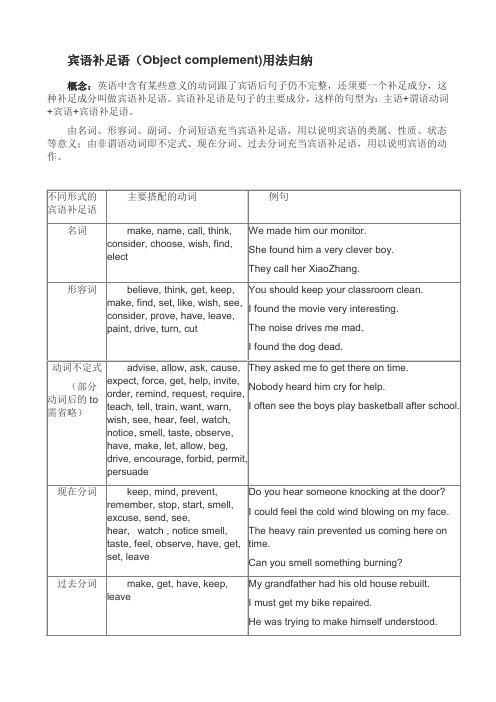
宾语补足语(Object complement)用法归纳概念:英语中含有某些意义的动词跟了宾语后句子仍不完整,还须要一个补足成分,这种补足成分叫做宾语补足语。
宾语补足语是句子的主要成分,这样的句型为:主语+谓语动词+宾语+宾语补足语。
由名词、形容词、副词、介词短语充当宾语补足语,用以说明宾语的类属、性质、状态等意义;由非谓语动词即不定式、现在分词、过去分词充当宾语补足语,用以说明宾语的动作。
①当感官动词和使役动词,如:see hear notice watch hear observe, listen to, feel(感官动词)make have let get(使役动词)接宾补时,不定式的符号to必须省略。
但在被动语态中,动词后要加to。
主动语态:The policeman made him tell everything.被动语态:He was made to tell everything by the policeman.②感官动词see, hear, watch, notice, observe后面的宾语补足语既可跟不带to的动词不定式,也可跟现在分词,其区别在于前者表示“经常性的,习惯性的动作”,后者表示“正在发生的瞬间动作”。
I often hear her sing English songs in the room.Suddenly, Zhang Hua heard someone shouting “Fire! Fire!”③在help后,不定式可以带to,也可不带。
Lucy often helps her brother (to) learn English.④有些动词只能用现在分词作宾语补足语,如:keep, mind, prevent, stop。
动词find, catch等的宾语可由现在分词作宾语补足语。
She caught her son smoking a cigarette.We’d be tter keep the fire burning.I don’t mind you joking. I like it.The heavy rain prevented us coming here on time.I found him drinking my whisky.⑤hope, demand, suggest等动词后面不能接不定式作宾语补足语。
分词做宾语补足语
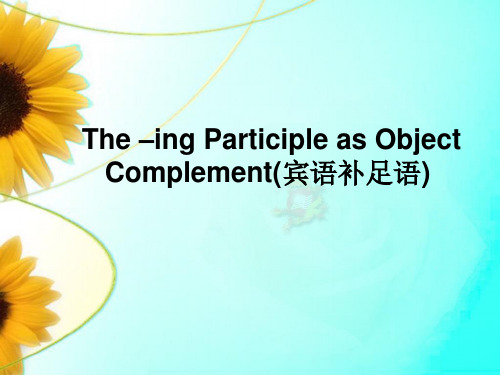
Practice
Fill in blanks:
knocking 1. I heard someone ___________(knock) at the door when I was watching TV. knock 2.Have you heard someone _______(knock) at the door ?
He was heard singing in the next room.
The next morning she found the man ____ in bed, dead.
A. lying
B. lie
C. lay
D. laying
A cook will be immediately fired if he is found ___ in the kitchen. A. smoke B. smoking C. to smoke D.smoked
2.在表示“致使”意义的动词后作宾语补足语。 这类动词有: make (不跟-ing分词作宾补), set, have, get, start, leave, keep, catch
– My father had me writing the whole morning. – He kept me waiting for a long time. – I caught him cheating in the exam. – He was left standing the whole morning. • -ed分词同样可以做“致使”动词的宾补。 – Can I make myself understood? That is a question. – He managed to get it done by himself.
分词做宾语补足语

The fatherቤተ መጻሕፍቲ ባይዱwants his daughter to learn the
piano.
We all enjoy listening to music. (宾语) 我看见他正在上楼。 I saw him going upstairs. (宾语补足语) 我们听见她在房间里唱歌。 We watched her crossing the street. V-ing作宾语补足语
3. We are pleased to see the problem ______ settled (settle) so quickly. 4. There was so much noise in the room that the speaker couldn’t make himself ______ heard (hear). 5. With the money ____ lost (lose), he couldn’t buy any ticket.
6. With winter coming _______ (come) on, it’s time to buy warm clothes.
used (use) 7. I’ve never heard the word ____ in spoken English. 8. The foreigner tried his best, but he still couldn’t make his point understood _________ (understand).
2.在表示“致使”意义的动词后作宾语补足语。 这类动词有: make (不跟-ing分词作宾补), set, have, get, start, leave, keep, catch
非谓语动词之宾语+宾补记忆口诀
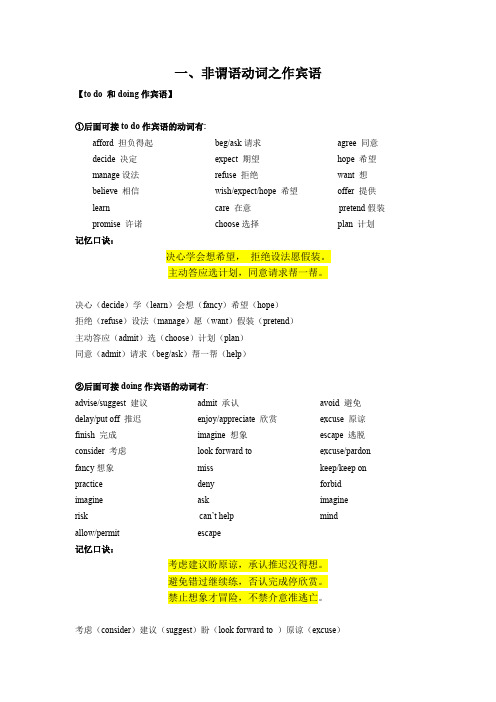
一、非谓语动词之作宾语【to do 和doing作宾语】①后面可接to do作宾语的动词有:afford 担负得起beg/ask请求agree 同意decide 决定expect 期望hope 希望manage设法refuse 拒绝want 想believe 相信wish/expect/hope 希望offer 提供learn care 在意pretend假装promise 许诺choose选择plan 计划记忆口诀:决心学会想希望,拒绝设法愿假装。
主动答应选计划,同意请求帮一帮。
决心(decide)学(learn)会想(fancy)希望(hope)拒绝(refuse)设法(manage)愿(want)假装(pretend)主动答应(admit)选(choose)计划(plan)同意(admit)请求(beg/ask)帮一帮(help)②后面可接doing作宾语的动词有:advise/suggest 建议admit 承认avoid 避免delay/put off 推迟enjoy/appreciate 欣赏excuse 原谅finish 完成imagine 想象escape 逃脱consider 考虑look forward to excuse/pardon fancy想象miss keep/keep on practice deny forbidimagine ask imaginerisk can’t help mindallow/permit escape记忆口诀:考虑建议盼原谅,承认推迟没得想。
避免错过继续练,否认完成停欣赏。
禁止想象才冒险,不禁介意准逃亡。
考虑(consider)建议(suggest)盼(look forward to )原谅(excuse)承认(admit)推迟(put off/delay)没得想(fancy)避免(avoid)错过(miss)继续(continue)练(practice)否认(deny)完成(finish)停(stop)欣赏(admire)禁止(forbid)想象(imagine)才冒险(risk)不禁(can’t help)介意(mind)准逃亡(escape)二、宾语补足语【to do 作为宾语补足语】①后面可接省略to作宾语补足语的动词速记口诀:一感,二听,三让,四看,半帮助一感:feel;二听:hear,listen to;三让:make,let,have;四看:see,notice,watch,observe;半帮助:help②后面接to do作宾语补足语的动词advise 建议allow 允许ask 让,叫want 想要beg 乞求cause 导致command 命令encourage 鼓励expect 期待forbid 禁止force 迫使get 使hate 讨厌leave 让oblige 迫使prefer 宁愿tell 告诉wish 希望help 帮助like 喜欢order 命令request 请求trouble 麻烦wait for 等待intend 想要mean 打算permit 允许remind 提醒bear 忍受would prefer 宁愿invite 邀请need 需要persuade 说服teach 教warn 警告would love 想要记忆口诀:说服建议求期望,忍受命令讨厌讲。
接宾语补足语的动词汇总
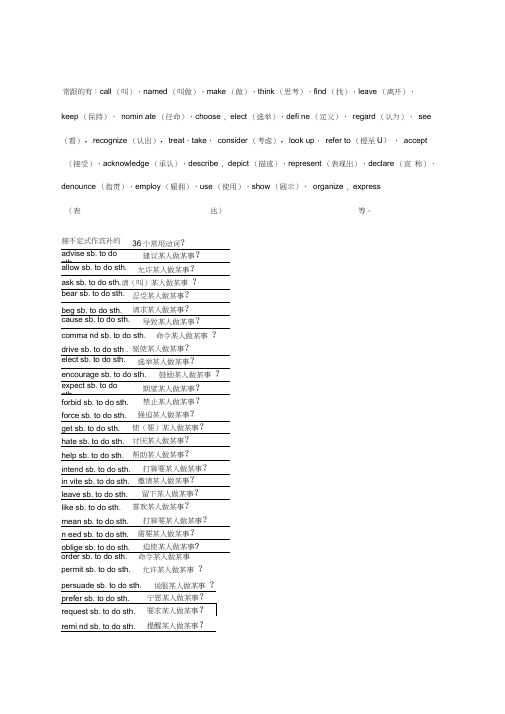
常跟的有:call (叫),named (叫做),make (做),think (思考),find (找),leave (离开),keep (保持),nomin ate (任命),choose , elect (选举),defi ne (定义),regard (认为),see (看),recognize (认出),treat,take,consider (考虑),look up,refer to (提至U),accept (接受),acknowledge (承认),describe , depict (描述),represent (表现出),declare (宣称),denounce (指责),employ (雇佣),use (使用),show (展示),organize , express(表达)等。
permit sb. to do sth. 允许某人做某事?常跟的有:call (叫),named (叫做),make (做),think (思考),find (找),leave (离开),teach sb. to do sth . 教某人做某事wa nt sb. to do sth. 想要某人做某事warn sb. to do sth. 警告某人做某事汉语的"阻止某人做某事”,英语可说成接现在分词作宾补的20个常用动词bring sb. doi ng sth.引起某人做某事catch sb. doing sth. 碰上(撞上)某人做某事discover sb. doi ng sth. 发现某人做某事feel sb. doi ng sth. 感觉某人做某事find sb. doi ng sth. 碰上(撞上)某人做某事get sb. doing sth. 使某人做某事have sb. doi ng sth. 使某人做某事hear sb. doi ng sth. 听见某人做某事keep sb. doi ng sth. 使某人不停地做某事listen to sb. doi ng sth. 听某人做某事The chairma n called on Mr Brown to speak .主席请布朗先生讲话。
宾语补足语英语
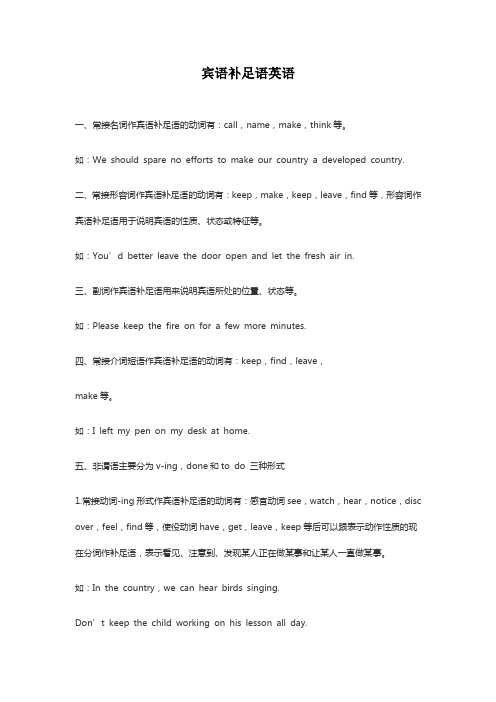
宾语补足语英语一、常接名词作宾语补足语的动词有:call,name,make,think等。
如:We should spare no efforts to make our country a developed country. 二、常接形容词作宾语补足语的动词有:keep,make,keep,leave,find等,形容词作宾语补足语用于说明宾语的性质、状态或特征等。
如:You’d better leave the door open and let the fresh air in.三、副词作宾语补足语用来说明宾语所处的位置、状态等。
如:Please keep the fire on for a few more minutes.四、常接介词短语作宾语补足语的动词有:keep,find,leave,make等。
如:I left my pen on my desk at home.五、非谓语主要分为v-ing,done和to do 三种形式1.常接动词-ing形式作宾语补足语的动词有:感官动词see,watch,hear,notice,disc over,feel,find等,使役动词have,get,leave,keep等后可以跟表示动作性质的现在分词作补足语,表示看见、注意到、发现某人正在做某事和让某人一直做某事。
如:In the country,we can hear birds singing.Don’t keep the child working on his lesson all day.2.接动词不定式作宾语补足语的动词有:ask,tell,want,teach,advise,allow,pers uade,warn,cause,require,encourage等;有些感官动词和使役动词,如:see,w atch,hear,feel,notice,observe,make,have,let等。
“动词+宾语+宾语补足语”结构

“动词+宾语+宾语补足语”结构
再看使役动词主动结构的用法:have sb. do/ doing/ done, make/let sb. do/ done have后也接do(省to)/ doing/ done作宾补,区别是:
1)do/ doing 均表主动关系,done表被动关系。 2)do/ doing虽然都表主动,但do指目前和将来或经常性、 反复性的动作。doing指目前正在进行的动作。
We found a cat lying under the chair. (现在分词短语作宾补,表主动、正在进行) 我们发现有一只猫躺在那把椅子下面。
The little girl often help her mother (to) do the housework. (带to或不带to的动词不定式作宾补) 这个小女孩经常帮她的 母亲做家务活。
“动词+宾语+宾语补足语”结构
【二、温馨提示】
1.接名词作宾语补足语的动词常见的有: call, think, elect, choose, consider, point等。 People call me Xiao Li. 人们称我小李。 We elected / made him our monitor. 我们选他当班长。
3)make/let与have的用法有点不同,make/let后一般不接 doing作宾补。相比之下,make/let sb. do/done的用法就简单 得多了。区别就是:do(省to)表示主动,done表示被动。
“动词+宾语+宾语补足语”结构
【三、习题练习】
1、The speaker raised his voice but still couldn’t make himself
高考英语专项语法宾语补足语
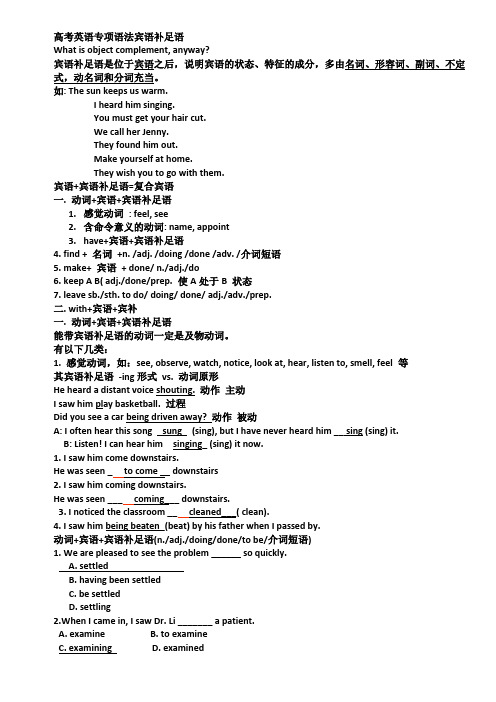
高考英语专项语法宾语补足语What is object complement, anyway?宾语补足语是位于宾语之后,说明宾语的状态、特征的成分,多由名词、形容词、副词、不定式,动名词和分词充当。
如: The sun keeps us warm.I heard him singing.You must get your hair cut.We call her Jenny.They found him out.Make yourself at home.They wish you to go with them.宾语+宾语补足语=复合宾语一. 动词+宾语+宾语补足语1.感觉动词: feel, see2.含命令意义的动词: name, appoint3.have+宾语+宾语补足语4. find + 名词+n. /adj. /doing /done /adv. /介词短语5. make+ 宾语+ done/ n./adj./do6. keep A B( adj./done/prep. 使A处于B 状态7. leave sb./sth. to do/ doing/ done/ adj./adv./prep.二. with+宾语+宾补一. 动词+宾语+宾语补足语能带宾语补足语的动词一定是及物动词。
有以下几类:1. 感觉动词,如:see, observe, watch, notice, look at, hear, listen to, smell, feel 等其宾语补足语-ing形式vs. 动词原形He heard a distant voice shouting. 动作主动I saw him play basketball. 过程Did you see a car being driven away? 动作被动A: I often hear this song sung (sing), but I have never heard him __ sing (sing) it.B: Listen! I can hear him singing_ (sing) it now.1. I saw him come downstairs.He was seen _to come __ downstairs2. I saw him coming downstairs.He was seen ___coming___ downstairs.3. I noticed the classroom __cleaned___( clean).4. I saw him being beaten_(beat) by his father when I passed by.动词+宾语+宾语补足语(n./adj./doing/done/to be/介词短语)1. We are pleased to see the problem ______ so quickly.A. settledB. having been settledC. be settledD. settling2.When I came in, I saw Dr. Li _______ a patient.A. examineB. to examineC. examiningD. examined3. The manager discussed the plan that they would like to see _______the next) year.(NMET2000)A. carry outB. carrying outC. carried out D.to carry out2. 含命名意义的动词,如:call, name, appoint, elect, make, consider等。
宾语补足语的归纳总结

宾语补足语的归纳总结宾语补足语是高考英语中常考的,但有许多考生都被难住了,那考生要怎么克服这个难点呢?尚不了解的小伙伴们看过来,下面由小编为你精心准备了“宾语补足语的归纳总结”,持续关注本站将可以持续获取更多的考试资讯!宾语补足语的归纳总结宾语补足语是英语教学中的难点,也是高考的热点,更是书面表达中必须具备的一种句型结构。
中学教学中最常见的使役动词有:make,have,leave。
他们都表示“使得”,后面都可接宾语+宾语补足语的结构,但用法上有所不同。
1. 我们推选他为我们足球队队长。
We made him captain of our football team.2. 我们队赢了的消息使我们大家非常高兴。
The news that our team had won made us very happy.3. 大雨使得我们无法出去。
The heavy rain made it impossible for us to go out.4. 奇怪的声音使我们感到恐惧。
The strange noise made us frightened.5. 在交通嘈杂声中他无法使自己的声音提高到让别人听到。
He couldn’t make himself heard above the noise of the traffic.6. 什么东西使得草生长?What makes the grass grow?注意:过去分词作make的宾语补足语时,变为被动语态不用加to; 但当不定式作其宾补时,变为被动语态一定要加to。
这个男孩被迫每天干十二个小时的活。
The boy was made to work twelve hours a day.1. Paul doesn’t have to be made ____. He always works hard.A. learnB. to learnC. learnedD. learning2. The result of the entrance exams was not made ____ to the public until last Thursday.A. knowingB. knownC. to knowD. to be known答案:1.B2.Bhave sb. do sth.使得某人做某事have sb. doing sth.使得某人一直做某事have sth. done使得某事被做1. The teacher had her ____(recite) the text again.2. He wants to have his eyes ____(examine) tomorrow.3. Be careful, or you’ll have your hands ____(hurt).4. He had the girl ____(stand) in the classroom the whole morning.5. He had the walls ____(paint) this morning.答案:1.recite 2.examined 3.hurt 4.standing 5.painted只能用doing的情况1. 表示正在发生Be quick. They have the car waiting for you at the school gate.2. 否定句中表示(不能)容忍某人做……Iwon’t have him cheating in the exam.3. 表示某一时间内一直延续不断的动作He had us laughing all through the meals.1. I’ve had my radio ____ so soon because my father had me ____ it. A. repair; done B. repaired; do C. repairing; do D. repaired; done2. You can’t have the horse ____ all the way. It’s too hot.A. runB. to runC. runningD. to be running3. Mrs. Brown was much disappointed to see the washing machine she had had ____ went wrong again.A. itB. it repairedC. repairedD. to be repaired4. We will have you ____(know) that the machine has been made ____(work) at full speed.答案:1.B 2.C 3.C 4.know, to work1. 用形容词作宾语补足语出去时,不要关门。
(完整版)非谓语动词作宾语补足语讲解与练习(修订版)

非谓语动词作宾语补足语定义:宾语补足语通常是位于宾语之后,说明宾语的状态、特征的成分,多由名词,形容词、副词、不定式,动名词个分词充当.如:The sun keeps us warm.We call her Jenny.They found him out.Make yourself at home.They wish you to go with them.I heard him singing.You must get your hair cut.宾语+宾语补足语=复合宾语,宾语和宾语补足语之间在逻辑上往往有主表、或者主谓的关系.一、动词不定式作宾补。
1.V1 + sb. + to do sth.常用动词有:advise 建议allow 允许ask 叫,请bear 忍受beg 乞求cause 导致command 命令encourage 鼓励expect 期待forbid 禁止force 迫使get 使hate 讨厌help 帮助intend 想要invite 邀请leave 让like 喜欢mean 打算need 需要oblige 迫使order 命令permit 允许persuade 说服prefer 宁愿request 请求remind 提醒teach 教tell 告诉trouble 麻烦want 想要warn 警告wish 希望wait for 等would like 想要would love 想要would prefer 宁愿persuade (劝说)sb to do sth = persuade sb into doing sth温馨提示:1.advise, forbid,allow, permit 这四个词后既可以直接加动名词作宾语,也可以接不定式作宾语补足语,即构成doing sthadvise/ forbid/ allow/ permitsb to do sth2.fear, excuse, refuse, insist, hope, suggest, agree, decide, demand, thank, arrange 等动词后不可接sb to do sth。
宾语补足语
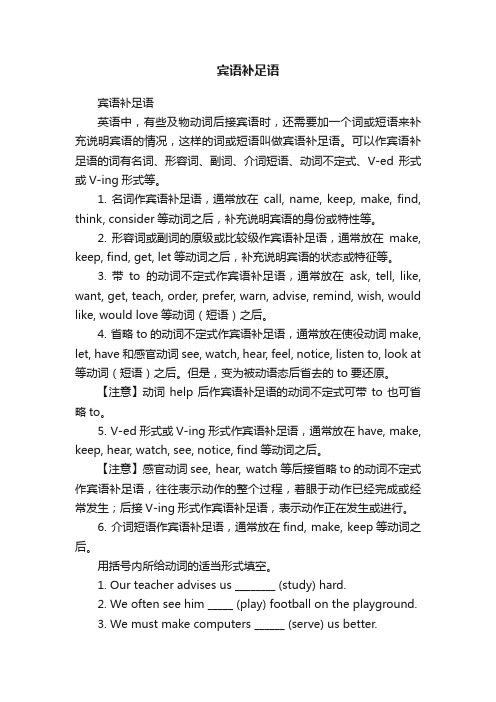
宾语补足语宾语补足语英语中,有些及物动词后接宾语时,还需要加一个词或短语来补充说明宾语的情况,这样的词或短语叫做宾语补足语。
可以作宾语补足语的词有名词、形容词、副词、介词短语、动词不定式、V-ed形式或V-ing形式等。
1. 名词作宾语补足语,通常放在call, name, keep, make, find, think, consider等动词之后,补充说明宾语的身份或特性等。
2. 形容词或副词的原级或比较级作宾语补足语,通常放在make, keep, find, get, let等动词之后,补充说明宾语的状态或特征等。
3. 带to的动词不定式作宾语补足语,通常放在ask, tell, like, want, get, teach, order, prefer, warn, advise, remind, wish, would like, would love等动词(短语)之后。
4. 省略to的动词不定式作宾语补足语,通常放在使役动词make, let, have和感官动词see, watch, hear, feel, notice, listen to, look at 等动词(短语)之后。
但是,变为被动语态后省去的to要还原。
【注意】动词help后作宾语补足语的动词不定式可带to也可省略to。
5. V-ed形式或V-ing形式作宾语补足语,通常放在have, make, keep, hear, watch, see, notice, find等动词之后。
【注意】感官动词see, hear, watch等后接省略to的动词不定式作宾语补足语,往往表示动作的整个过程,着眼于动作已经完成或经常发生;后接V-ing形式作宾语补足语,表示动作正在发生或进行。
6. 介词短语作宾语补足语,通常放在find, make, keep等动词之后。
用括号内所给动词的适当形式填空。
1. Our teacher advises us ________ (study) hard.2. We often see him _____ (play) football on the playground.3. We must make computers ______ (serve) us better.4. My parents told me not _________ (spend) too much time watching TV.5. I saw him _______ (play) basketball when I passed the playground.链接中考1. My roommate often asks me ________ her to play chess.A. teachB. teachingC. to teach2. The woman made his son ______ finally after she told him some jokes .A. laughedB. to laughC. laughD. laughing3. -- I saw Ann ______ a green dress at the school meeting.-- I think she looks better ______ red.A. dressed; inB. put on; wearC. wearing; inD. wear; put on4. The scientist tried his best to make his view ______.A. to understandB. understandC. understoodD. understanding5. The soft music makes me _______ (relax).6. The music makes him ______ (want) to sleep.7. He made me _______(repeat) it.8. The picture makes me _________ (energy).9.Young parents usually don’t know how ________ (make) a baby happy.10.He said again in order to make himself __________ (understand).They also have to know how to make money.他们还必须知道如何赚钱。
(完整版)接宾语补足语的动词汇总
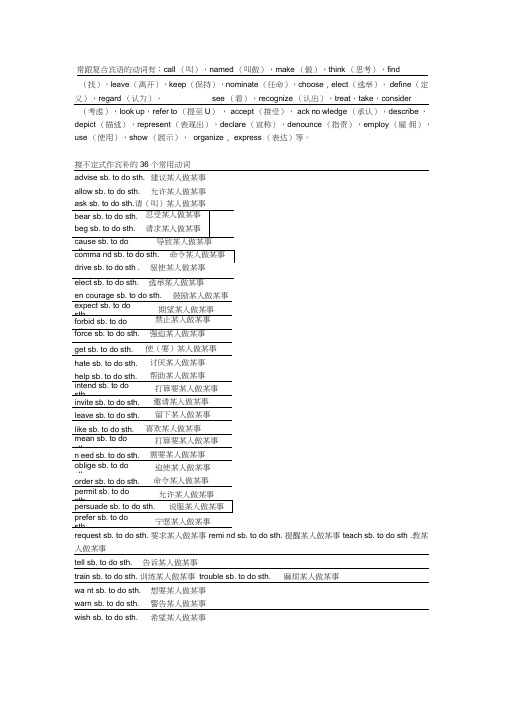
常跟复合宾语的动词有:call (叫),named (叫做),make (做),think (思考),find (找),leave (离开),keep (保持),nominate (任命),choose , elect (选举),define (定义),regard (认为),see (看),recognize (认出),treat,take,consider(考虑),look up,refer to (提至U),accept (接受),ack no wledge (承认),describe ,depict (描述),represent (表现出),declare (宣称),denounce (指责),employ (雇佣),use (使用),show (展示),organize , express (表达)等。
接不定式作宾补的36个常用动词advise sb. to do sth. 建议某人做某事allow sb. to do sth. 允许某人做某事request sb. to do sth. 要求某人做某事remi nd sb. to do sth. 提醒某人做某事teach sb. to do sth .教某人做某事tell sb. to do sth. 告诉某人做某事train sb. to do sth. 训练某人做某事trouble sb. to do sth. 麻烦某人做某事wa nt sb. to do sth. 想要某人做某事warn sb. to do sth. 警告某人做某事wish sb. to do sth. 希望某人做某事汉语的"原谅某人做某事”,英语可说成excuse [forgive] sb. for doi ng sth.不带to的不定式作宾补动词不定式在使役动词( make , let, have )或感官动词(feel , listen to , hear, look at , see , watch , notice )之后作宾补时不定式需省去to。
宾语补足语

宾语补足语有以下几类。
1.由动词不定式充当。
多数是带to的不定式,也有不带to的不定式。
1).要求带to的不定式作宾语补足语的动词有tell,ask,invite,force,get,beg,allow,wish,want,like,prefer,intend,expect,encourage,advise,permit,order,warn,cause等。
eg.I would prefer you not to change your plan.我宁愿你不要改变计划。
They encouraged me to try again.他们鼓励我再次尝试。
2).某些动词如think,consider,believe,know,find等后面作宾语补足语的不定式常用to be + adj.的结构。
eg.We believed him to be stupid.我们认为他很笨。
He didn”t consider himself (to be) important.他并不认为自己重要。
3).某些动词如make,have,let,see,hear,watch,notice,feel等后作宾语补足语的不定式不带to。
eg.He made us stay for tea.他使我们留下来吃茶点。
Let me introduce you to Miss Li.让我介绍你和李小姐认识。
Did you notice me leave/leaving the house.你注意到我离开了(正在离开)那房子吗?4).变为被动语态时,不定式符号to必须保留。
eg.People who won’t work should be made to work.必须要不愿工作的人工作。
The middle-aged man was seen to enter the building.人们看见那中年男子走进大楼。
2.由-ing形式或过去分词充当。
宾语补足语汇总.

用所给动词的恰当形式填空: 1. It’s difficult to get a car ___________ (go) to go on a cold morning.
2. His failing the exam got his parents
________ worried (worry). 3. I have had my bike ________ repaired (repair), and I’m going to have my brother ______ repair
1. We consider her performance a big success. 2. Polly heard it hit the step. 3. People believe dogs to be honest.
1. What is Object complement ?? An object complement gives information 宾语补足语是对宾语做出进一步的补充说明 about the object.
D. 只接现在分词的动词有:
Keep , catch , stop , prevent , mind…
Eg. She caught her son smoking in the room.
Exercise:
1. The workers here are made to work ____________(work) ten hours a day. 2. The missing boy was last playing seen ___________(play) by the riverside.
C. 接不带to的不定式做宾补的动词:
常考的动词+宾语+宾补结构

一、“make+宾语+宾补”的用法“make+宾语+宾补”这一结构中,宾语补足语可以由名词、形容词、过去分词、不定式等来充当,例如:(1) A good friend is someone who makes you happy.(形容词作宾补)(2) They made me repeat the story.(省to的动词不定式)(3) He raised his voice to make himself heard.(过去分词作宾补)注:“make+宾语+宾补”结构中不用现在分词充当宾补。
(4)We made him monitor of our class.(名词作宾补)注:职务名词充当宾补时其前面不要加冠词。
【试题链接】1. He is very popular among his students as he always tries to make them _____ in his lectures. A.interested B.interesting C.interest D.to interest2. My parents have always made me _____ about myself, even when I was twelve. A.feeling well B.feeling good C.feel well D.feel good答案:1.A 2.D二、“with+宾语+宾补”的用法“with+宾语+宾补”是高考试题中考查十分频繁的结构,“with+宾语+宾补”结构中的宾补主要有形容词、现在分词、过去分词、动词不定式等,在考题中常要求选择宾补的形式,在选择时宾补空间该使用什么形式,主要限决于宾语与宾补的关系,主动关系用现在分词,被动关系则用过去分词,此外,不定式作宾补要表示含义为将来的意味,例如:(1) With so many people communicating in English every day, it will become more and more important to have a good knowledgeof English.(宾语so many people与communicate是主动关系,因此用现在分词作宾补)(2) With everything he needed to buy, he went into the store. (不定式作宾补表示将来的含义)(3) With everything he needed bought, he left the store. (过去分词作宾补表被动表完成)(4) With my key lost, I couldn’t enter my room. (过去分词作宾补)(5) With nothing to do, I went out for a walk. (不定式作宾补)(6) I went out with the window open. (形容词作宾补)另外,“with+宾语+宾补”结构中还可由介词短语、副词短语来充当宾补,如:(1) She said good-bye with tears in her eyes.(2) He left the room with the light still on.【试题链接】1. ----Come on, please give me some ideas about the project.----Sorry. With so much work ______ my mind, I almost break down. A.filled B.filling C.to fill D.being filled2. John received an invitation to dinner, and with his work ______ he gladly accepted it.A.finished B.finishing C.having finished D.was finished3. I couldn’t to my homework with all the noise______.A.going on B.goes on C.went on D.to go on答案:1. B 2. A 3. A三、“have+宾语+宾补”的用法在“have+宾语+宾补”这一结构用法中,充当宾补的常用的有do,doing, done 和adj,例如:(1) I’ll have my hair cut this afternoon.我今天下午要理发。
动词不定式知识点详解(初中英语专项复习)10
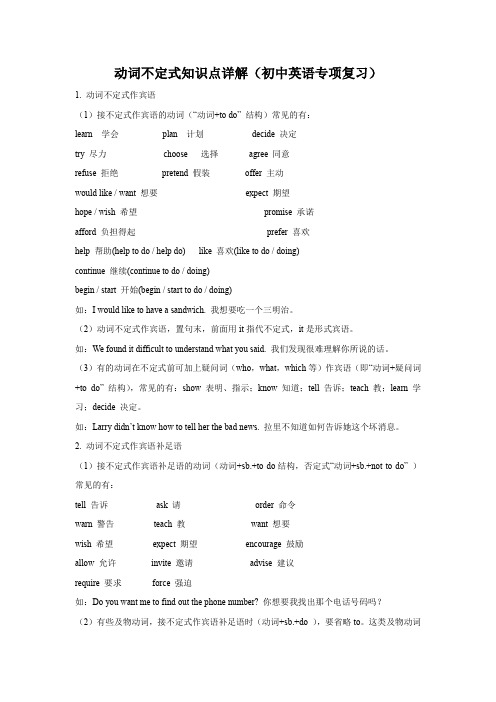
动词不定式知识点详解(初中英语专项复习)1. 动词不定式作宾语(1)接不定式作宾语的动词(“动词+to do” 结构)常见的有:learn 学会plan 计划decide 决定try 尽力choose 选择agree 同意refuse 拒绝pretend 假装offer 主动would like / want 想要expect 期望hope / wish 希望promise 承诺afford 负担得起prefer 喜欢help 帮助(help to do / help do) like 喜欢(like to do / doing)continue 继续(continue to do / doing)begin / start 开始(begin / start to do / doing)如:I would like to have a sandwich. 我想要吃一个三明治。
(2)动词不定式作宾语,置句末,前面用it指代不定式,it是形式宾语。
如:We found it difficult to understand what you said. 我们发现很难理解你所说的话。
(3)有的动词在不定式前可加上疑问词(who,what,which等)作宾语(即“动词+疑问词+to do” 结构),常见的有:show 表明、指示;know 知道;tell 告诉;teach 教;learn 学习;decide 决定。
如:Larry didn’t know how to tell her the bad news. 拉里不知道如何告诉她这个坏消息。
2. 动词不定式作宾语补足语(1)接不定式作宾语补足语的动词(动词+sb.+to do结构,否定式“动词+sb.+not to do” )常见的有:tell 告诉ask 请order 命令warn 警告teach 教want 想要wish 希望expect 期望encourage 鼓励allow 允许invite 邀请advise 建议require 要求force 强迫如:Do you want me to find out the phone number? 你想要我找出那个电话号码吗?(2)有些及物动词,接不定式作宾语补足语时(动词+sb.+do ),要省略to。
接复合宾语的动词句型总结
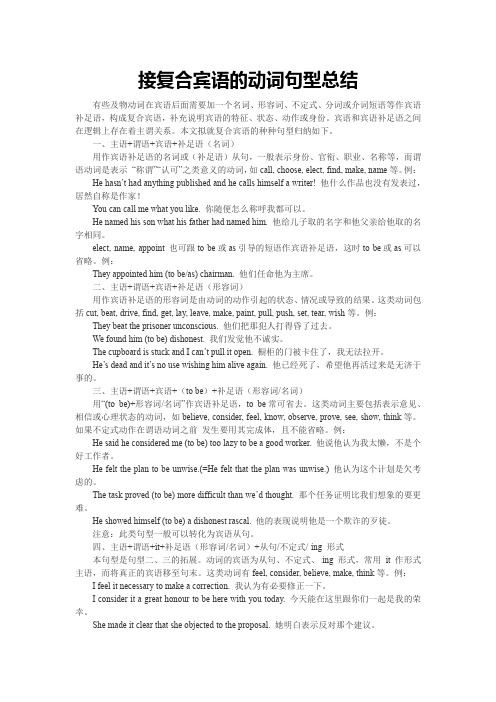
接复合宾语的动词句型总结有些及物动词在宾语后面需要加一个名词、形容词、不定式、分词或介词短语等作宾语补足语,构成复合宾语,补充说明宾语的特征、状态、动作或身份。
宾语和宾语补足语之间在逻辑上存在着主谓关系。
本文拟就复合宾语的种种句型归纳如下。
一、主语+谓语+宾语+补足语(名词)用作宾语补足语的名词或(补足语)从句,一般表示身份、官衔、职业、名称等,而谓语动词是表示“称谓”“认可”之类意义的动词,如call, choose, elect, find, make, name等。
例:He hasn’t had anything published and he calls himself a writer! 他什么作品也没有发表过,居然自称是作家!You can call me what you like. 你随便怎么称呼我都可以。
He named his son what his father had named him. 他给儿子取的名字和他父亲给他取的名字相同。
elect, name, appoint 也可跟to be或as引导的短语作宾语补足语,这时to be或as可以省略。
例:They appointed him (to be/as) chairman. 他们任命他为主席。
二、主语+谓语+宾语+补足语(形容词)用作宾语补足语的形容词是由动词的动作引起的状态、情况或导致的结果。
这类动词包括cut, beat, drive, find, get, lay, leave, make, paint, pull, push, set, tear, wish等。
例:They beat the prisoner unconscious. 他们把那犯人打得昏了过去。
We found him (to be) dishonest. 我们发觉他不诚实。
The cupboard is stuck and I can’t pull it open. 橱柜的门被卡住了,我无法拉开。
宾语补足语--牛津英语
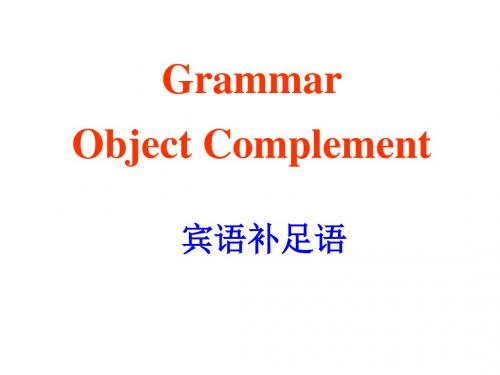
使我成为主席
They have made me a nice chair.
(直接宾语)为我做了把好椅子
第四类, v + sb. + to do sth. 结构中的
动词, 所接的宾补一般是不定式。 advise, allow, ask, beg, cause, expect, force, get, help, inspire, invite, order, permit, persuade, remind, request, require, teach, tell, train, urge, want, warn, wish, report等
What can be object complement? 1. Through the window, I could see the rain coming down heavily. (现在分词短语) 2. Mother made Charles tidy his bedroom
before he went out. (不带to不定式短语) 3. They made him director of the Pompeii dig. (名词或名词短语)
易错题 Returning home, I found the book missing (miss ). _______ That afternoon, I found her _______ 考真题 1. Don’t leave the water __
改出一处错并指出宾补:
it 1.None of us think likely that anyone survived the air crash. 2.The government is considering a law to make it illegal advertising cigarette. to advertise
- 1、下载文档前请自行甄别文档内容的完整性,平台不提供额外的编辑、内容补充、找答案等附加服务。
- 2、"仅部分预览"的文档,不可在线预览部分如存在完整性等问题,可反馈申请退款(可完整预览的文档不适用该条件!)。
- 3、如文档侵犯您的权益,请联系客服反馈,我们会尽快为您处理(人工客服工作时间:9:00-18:30)。
常跟复合宾语的动词有:call(叫),named(叫做),make(做),think(思考),find (找),leave(离开),keep(保持),nominate(任命),choose,elect(选举),define(定义),regard(认为),see(看),recognize(认出),treat,take,consider (考虑),look up,refer to(提到),accept(接受),acknowledge(承认),describe,depict(描述),represent(表现出),declare(宣称),denounce(指责),employ(雇佣),use(使用),show(展示),organize,express(表达)等。
接不定式作宾补的36个常用动词
advise sb. to do sth. 建议某人做某事
allow sb. to do sth. 允许某人做某事
ask sb. to do sth.请(叫)某人做某事
bear sb. to do sth.忍受某人做某事
beg sb. to do sth. 请求某人做某事
cause sb. to do sth. 导致某人做某事
command sb. to do sth. 命令某人做某事
drive sb. to do sth .驱使某人做某事
elect sb. to do sth. 选举某人做某事
encourage sb. to do sth. 鼓励某人做某事
expect sb. to do sth. 期望某人做某事
forbid sb. to do sth. 禁止某人做某事
force sb. to do sth. 强迫某人做某事
get sb. to do sth. 使(要)某人做某事
hate sb. to do sth. 讨厌某人做某事
help sb. to do sth. 帮助某人做某事
intend sb. to do sth. 打算要某人做某事
invite sb. to do sth. 邀请某人做某事
leave sb. to do sth. 留下某人做某事
like sb. to do sth. 喜欢某人做某事
mean sb. to do sth. 打算要某人做某事
need sb. to do sth. 需要某人做某事
oblige sb. to do sth. 迫使某人做某事
order sb. to do sth. 命令某人做某事
permit sb. to do sth. 允许某人做某事
persuade sb. to do sth. 说服某人做某事
prefer sb. to do sth. 宁愿某人做某事
request sb. to do sth. 要求某人做某事
remind sb. to do sth. 提醒某人做某事
teach sb. to do sth .教某人做某事
tell sb. to do sth. 告诉某人做某事
train sb. to do sth. 训练某人做某事
trouble sb. to do sth. 麻烦某人做某事
want sb. to do sth. 想要某人做某事
warn sb. to do sth. 警告某人做某事
wish sb. to do sth. 希望某人做某事
汉语的“原谅某人做某事”,英语可说成excuse [forgive] sb. for doing sth.。
汉语的“希望某人做某事”,英语可说成wish sb. to do sth.。
汉语的“建议某人做某事”,英语可说成advise sb. to do sth.。
汉语的“安排某人做某事”,英语可说成arrange for sb. to do sth.。
汉语的“要求某人做某事”,英语可说成demand of sb. to do sth.。
汉语的“感谢某人做某事”,英语可说成thank sb. for doing sth.。
汉语的“祝贺某人做某事”,英语可说成congratulate sb. on doing sth.。
汉语的“阻止某人做某事”,英语可说成prevent sb. from doing sth.。
接现在分词作宾补的20个常用动词
bring sb. doing sth.引起某人做某事catch sb. doing sth. 碰上(撞上)某人做某事discover sb. doing sth. 发现某人做某事feel sb. doing sth. 感觉某人做某事
find sb. doing sth. 碰上(撞上)某人做某事get sb. doing sth. 使某人做某事
have sb. doing sth. 使某人做某事hear sb. doing sth. 听见某人做某事
keep sb. doing sth. 使某人不停地做某事listen to sb. doing sth. 听某人做某事
look at sb. doing sth. 看着某人做某事notice sb. doing sth. 注意到某人做某事observe sb. doing sth. 观察某人做某事prevent sb. doing sth. 阻止某人做某事
see sb. doing sth. 看见某人做某事send sb. doing sth.使某人(突然)做某事set sb. doing sth. 使(引起)某人做某事start sb. doing sth. 使某人开始做某事
stop sb. doing sth. 阻止某人做某事watch sb. doing sth. 观察某人做某事
接动词原形作宾补的11个常用动词
feel sb. do sth. 感觉某人做某事have sb. do sth. 使某人做某事
hear sb. do sth. 听见某人做某事let sb. do sth.让某人做某事
listen to sb. do sth. 听着某人做某事look at sb. do sth. 看着某人做某事
make sb. do sth. 使某人做某事notice sb. do sth. 注意某人做某事observe sb. do sth. 观察某人做某事see sb. do sth. 看见某人做某事
watch sb. do sth. 观察某人做某事
在某些短语后也可跟带to的不定式作宾补。
这类动词短语常见的有:wait for,call on,depend on,care for,long for等。
例如:
The crocodile waited for the monkey to come down again.鳄鱼等着猴子再下来。
The chairman called on Mr Brown to speak.主席请布朗先生讲话。
I shouldn't care for that man to be my doctor.我不要那人给我看病。
不带to的不定式作宾补
动词不定式在使役动词(make,let,have)或感官动词(feel,listen to,hear,look at,see,watch,notice)之后作宾补时不定式需省去to。
为了便于记忆,我们可以这样记“一感”(feel)、“二听”(listen to,hear)、“三让”(let,make,have)、“四看”(look at,see,watch,notice)。
